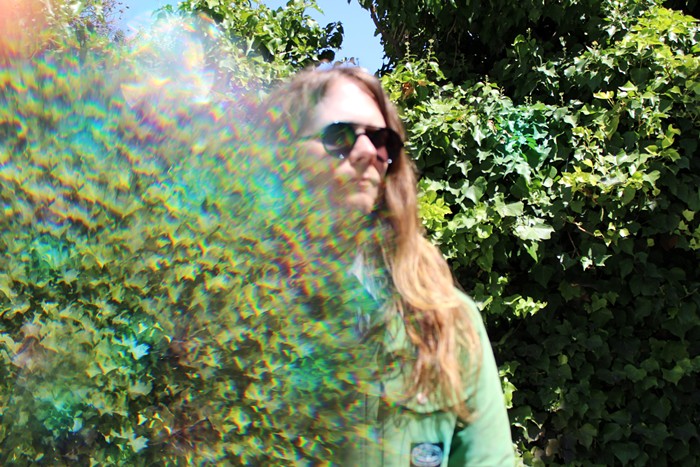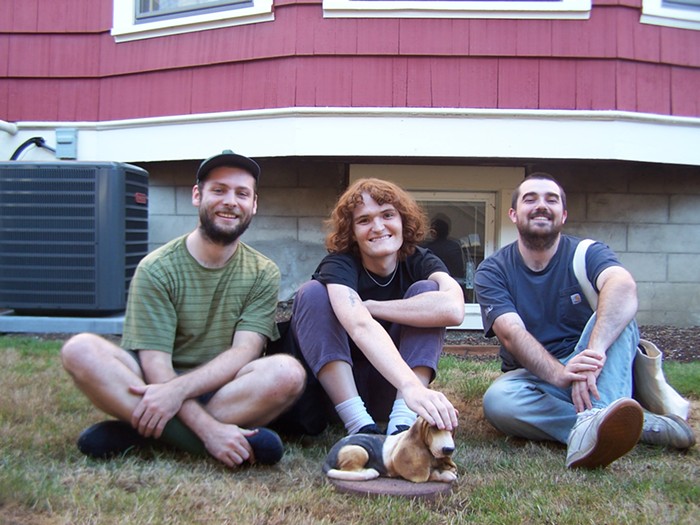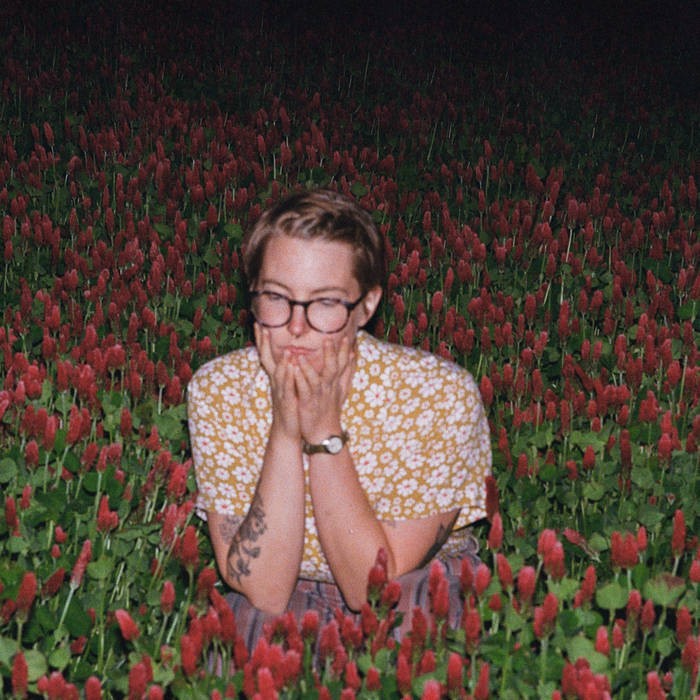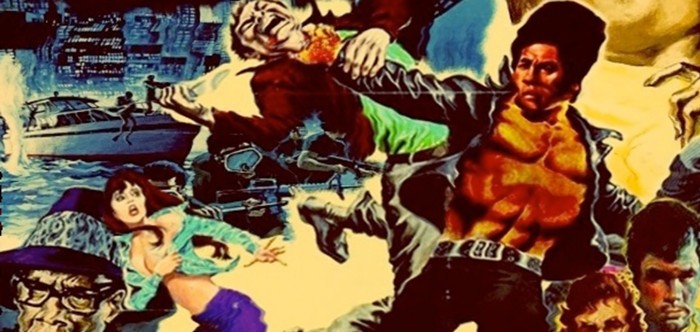IN THE LATE 1950s, Ural Thomas started making music on the streets of Portland—North Williams Avenue, to be specific.
"We used to do dances in the streets with no bands," Thomas says. "People would just gather around. Pretty soon we had everybody clappin' their hands. And what was popular then was stuff like the Hambone, and the Alligator."
From his chair, the 73-year-old Thomas—who looks and acts decades younger—lights up, wide-eyed, invoking the moment. "Hey!" he grunts. "Huh!" Building a rhythm, clapping along with the vocal melody, his hips sway as he pantomimes prone bodies in push-up position springing over one another. He is now, just as he was then, an entertainer.
"Pretty soon," Thomas continues, "we had so many people coming up to Irvington Park that the police came up and ran us out. They says, 'Ahh, you can't do this. You need a permit for this.'"
And so began a life in music that would take Ural Thomas to Hollywood, performing alongside Mick Jagger on the Sunset Strip, to New York's Apollo Theater as part of the Otis Redding Revue, and beyond. After some bad breaks and disillusionment with the industry, Thomas returned to Portland bruised but not broken, his zeal and conscience intact. He hoped to find a new band—one who loved sharing love and music as much as he did.
Fifty years later, he may have found it.
Just a few blocks from the North Portland home he built using mostly recycled and scavenged materials, Thomas entered Mississippi Records in search of an LP. "I think it might have been Curtis Mayfield," he says.
Quickly, Thomas struck up a conversation with Mississippi Records owner Eric Isaacson. He mentioned the 45 RPM singles he had cut decades before. Isaacson not only found the Mayfield LP, but Thomas' two singles as well. Isaacson presented them to the creator, who hadn't seen them in years.
Isaacson wasn't done. In 2011, Mississippi Records put out two more of Thomas' early singles on 45. While copies moved among connoisseurs, Thomas and his recordings remained in relative obscurity, both in Portland and beyond.
Spinning records as DJ Cooky Parker, Scott Magee was also in search of rare and ripping 45s—particularly 1950s and '60s soul, R&B, and funk. When Isaacson showed Magee the Thomas 45s, Magee couldn't believe his ears.
"I just thought it was amazing that there was a guy that lived here now, who is still alive, who grew up here, that made a record that sounds like the records I love," says Magee.
At that time, Magee had hit a wall after years drumming in bands like Loch Lomond and Y La Bamba. Yet even upon discovering Thomas' singles, Magee didn't imagine what would come next. Instead, the idea of forming a group behind Thomas was Isaacson's. And when Magee heard Thomas might be interested, he went about building a band. A big one.
Ural Thomas was born in Meraux, Louisiana, the seventh of 16 children. When he was four or five, Thomas' family relocated to Portland. Thomas' father, who went on to work for Fred Meyer, was a minister.
"My dad would say, 'One of you has to be a preacher,'" Thomas remembers. "And I said, 'Dad, I'm not going to be a preacher.'"
His mother played guitar and he loved listening to her strum around the house. "She never performed anyplace," Thomas says. "Because she was into the church. She didn't believe... what I'm doing now would be a sin in my folks' eyes.
"But I told them then: Everything belongs to God; that's the way you raised me. And so I studied, and I found out inside myself that I feel just as good in the church as I do when I'm among wonderful people in the clubs. You've got bad people in the church, too."
Thomas' upbringing was hardscrabble, but fulfilling. He worked with his father, building and tearing down houses. After the ragtag performances along N Williams, Thomas formed a vocal group called the Montereys.
"They were from a different walk of life, completely," Thomas remembers. "There were mostly like college kids and I'm straight off the street. Not a gangster, but I did all kinds of stuff for survival. And these guys, they heard about me, and they asked me to come over and sing with 'em."
At Thomas' urging, the Montereys found a backing band named the Invaders. Together, the Montereys with the Invaders played all over Portland and beyond, sharing regional gigs (and sometimes band members) with the Kingsmen, as well as opening for national acts like Ray Charles, Etta James, and Big Mama Thornton at Portland's Cotton Club, the city's flashpoint for black entertainment in the 1960s. But the audiences—and the band—weren't segregated.
"Sometimes we played for all black audiences," Thomas remembers. "But we had a mixed band. It was always a mixed band."
Bolstered by the local response, Thomas, along with his lifelong friend David, left Portland for LA. They slept on the couches of fellow musicians as they scrounged for gigs, put together a band, and found a record producer, David Goldstein.
Together with Goldstein and his newly formed LA band, Thomas wrote and recorded an album's worth of material—including Thomas' most immediate and indelible track, "Pain Is the Name of Your Game," a searing shock of sweaty, heartbroken, cracking, big band R&B. After the sessions wrapped, Thomas says he sold off any and all future interest in the songs to Goldstein for $3,500. Thomas shared the money evenly with the rest of the band, who split after receiving their shares.
"They thought they were stars," Thomas remembers. "They took off. They all went in different directions—every one of 'em. But that was okay. I said, 'Whatever you want—you can't make me happy if you don't want to be here, because the work is really just beginning.'"
Without a band to promote the record, UNI (a division of MCA) mostly let the material languish, releasing two singles, "Pain" and "Can You Dig It?" Yet Thomas remained in high spirits; as long as he was playing music, he was happy. One evening was particularly surreal.
"I was down there getting loaded, trippin' with the 13th Floor Elevators, the Mothers of Invention," he says. "We was havin' a good time." A message came from a club on the Sunset Strip: "They said, 'Ural, there's this guy down here, he just got here from England and they need someone to open up.'" The guy from England, Thomas says, was Mick Jagger.
"I went down there and me and him did some stuff onstage together," Thomas remembers. "We had a good time! We danced together. That was fun. I wonder if he would still remember that?"
Thomas remained in Los Angeles for about two years before taking up another opportunity to travel, thanks to music. "I went to Cincinnati with this guy named Buddy Hobgood," Thomas says. "He was James Brown's road manager. He became my personal manager."
But Hobgood asked Thomas to do something he simply couldn't abide: to disown his friend David, the one who originally moved with Thomas to Los Angeles in the first place.
"'I can't get rid of him,'" Thomas remembers telling Hobgood of David. "I said: 'Just tell me what you want. I'll do what you want me to do. What does that have to do with him? I don't even give a fuck about the money. Because I'm going to make money, and I don't expect to make it like you.'"
The ultimatum shook Thomas. Band members taking off was one thing. Being asked go against his own heart was another. After a few months playing local clubs and cutting a live album in Cincinnati, Thomas left for New York City.
"I took a bus and I walked into the Apollo Theater," Thomas remembers. "I didn't even know who was gonna be there, and I said, 'Uh, I'm supposed to show up for rehearsal.' He said, 'Who are you?' He looked at me and said, 'Are you any good?' I said, 'Man, there's no such word—I'm better than that.' He said, 'Well, goddammit, we havin' a rehearsal downstairs and we gon' find out.'"
Thomas delivered and, backed by the Bar-Kays, was offered to play two songs each night opening for Otis Redding. Although the shows themselves went well, Thomas was struck by the lack of community.
"Otis Redding never even spoke to me," Thomas says. "I did all those shows with him and he never even said 'Good morning.'
"It was kind of heartbreaking because I was looking so forward to being there," Thomas remembers. "I felt so lucky, like it was a godsend thing for me to be there, because that's what I wanted to be."
But Thomas didn't have the cold ambition necessary to push on. "I never did care about being a superstar," he says. "I always wanted to be a part of something—I'm a group type of person. I like unity." So he left New York and returned to Portland in the late '60s, searching for that group.
Upon his return, Thomas established a Sunday jam session, inviting members of the community whether they could play or not. It continues to this day. He also stayed active with numerous projects, including writing and recording in a gospel group with his old friend David, as well as performing solo, and as a backing player in a zydeco group.
Over the years there have been countless others. And while Thomas found the community, the love, and the pure joy of playing and performing, he never quite found another big band that really cooked—not like the one that left him in LA.
Having spent nearly a decade in Portland's fertile music scene, Scott Magee was familiar with a vast array of local players. Needing horns, keys, backup singers, and a snapping rhythm section, he sought only the very best. In recruiting, Thomas' early recordings proved essential.
Magee laughs, "I always tell my friends: None of these people would be in a band where I was the leader if it was my music." Yet Magee maintains a role in steering the ship.
"One of my visions was that I would curate the music as a record collector," says Magee. And because Thomas' catalog is spotty—at least from his '60s big-band soul era—Magee picked songs from his own collection to play in the band alongside Thomas' originals.
This spring, after learning a few of Thomas' originals beforehand, the band assembled with their prospective frontman for the first time. After a brief introduction, Magee felt there was little else to do but simply play. He clicked his drumsticks in 3/4 time, and the band launched into "Pain Is the Name of Your Game."
"It was amazing what happened," Magee says. "We came in strong, and he gave us a look that he was excited about it and he grabbed a microphone and just belted the song out. All of us got chills. It was right at that moment that I knew: If this thing comes together, it's going to be really, really special."
The two shows Ural Thomas and the Pain played this summer confirmed Magee's hunch and reenergized his interest in playing. Part of that realignment is thanks to Thomas' unbending zeal.
"He has taught me what is, I think, a wonderful approach to music," Magee says. "Especially to hold on to that at his age, to see that it's not about specific, superficial goals or things that have to do with impressing other people or showing off or anything like that. It's just this pure, joyful approach of having the music bring people together." Indeed, Thomas and the Pain have grown close. "He's always talking about the band as a family and how he cares for us," Magee says.
While the future for Thomas and the Pain is anything but certain, both Thomas and Magee hope this is only the beginning. Citing Daptone Records as a model, they envision writing and recording original material going forward. Regardless of where the group may or may not go, Thomas counts himself among the blessed.
"I feel very lucky," he says. "Because a lot of people my age have already given up on everything and they've decided they're just going to get old and die. As long as I can and I feel like I've got something to give, I want to be there."



















